牛津译林版(2020)必修第二册Unit 2 Be Sporty,Be Healthy Extended reading 课件(共22张PPT,内嵌视频)
文档属性
| 名称 | 牛津译林版(2020)必修第二册Unit 2 Be Sporty,Be Healthy Extended reading 课件(共22张PPT,内嵌视频) | 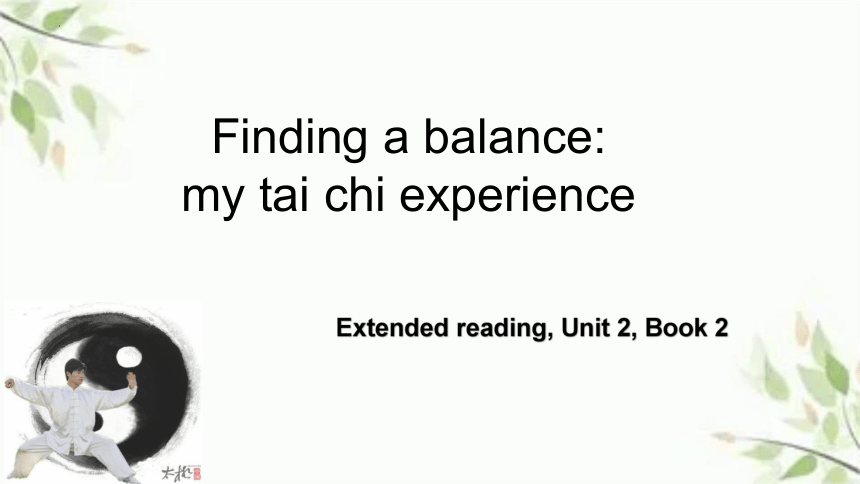 | |
| 格式 | pptx | ||
| 文件大小 | 35.3MB | ||
| 资源类型 | 教案 | ||
| 版本资源 | 牛津译林版(2019) | ||
| 科目 | 英语 | ||
| 更新时间 | 2023-12-13 20:02:05 | ||
图片预览

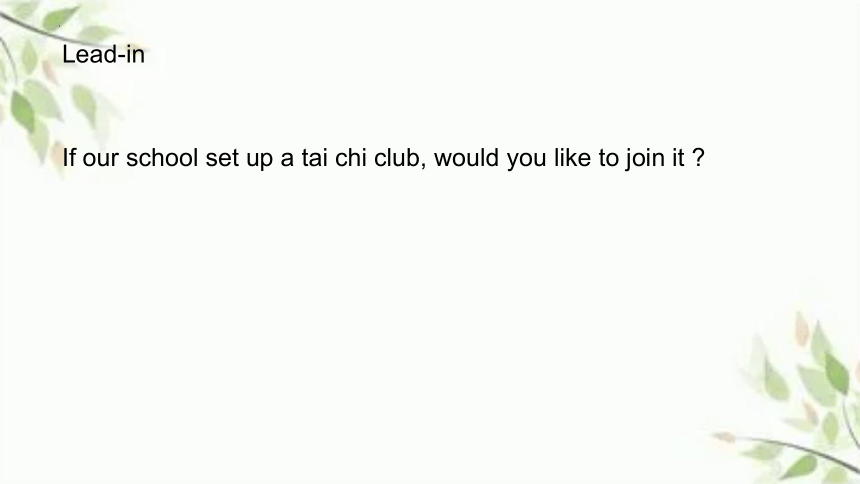
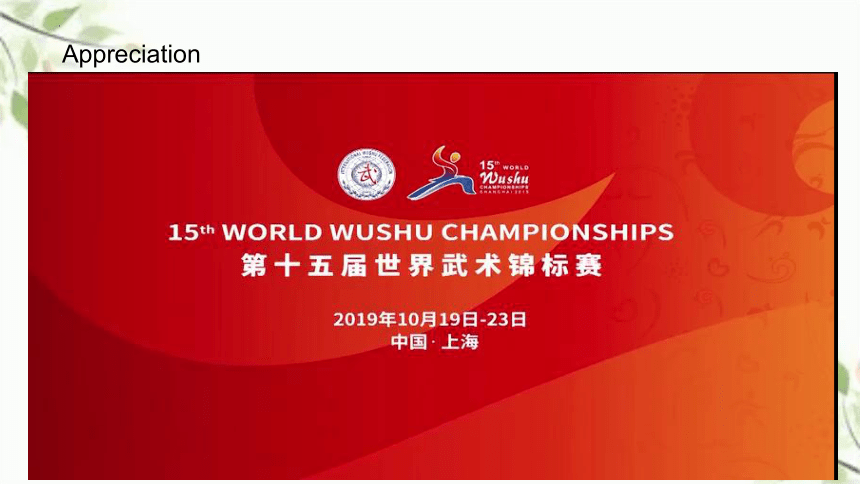

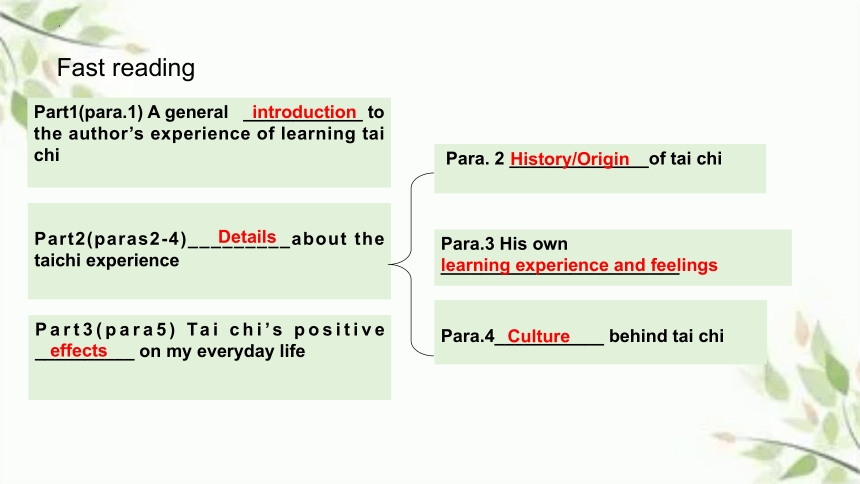

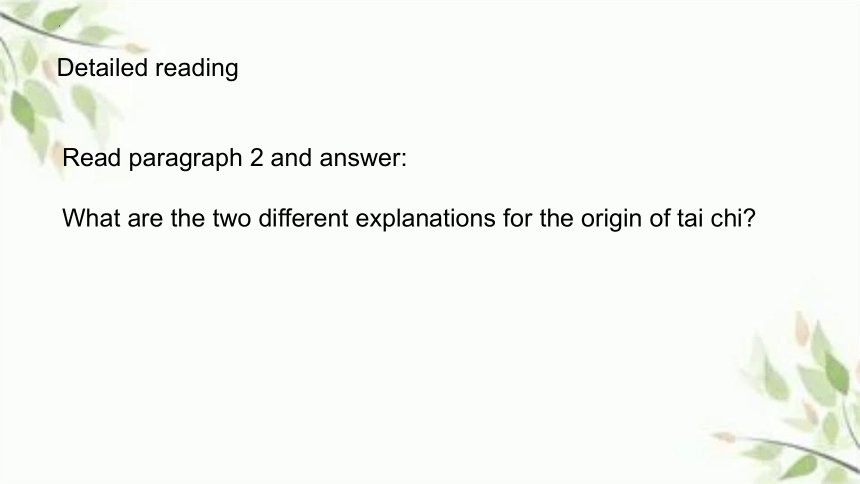
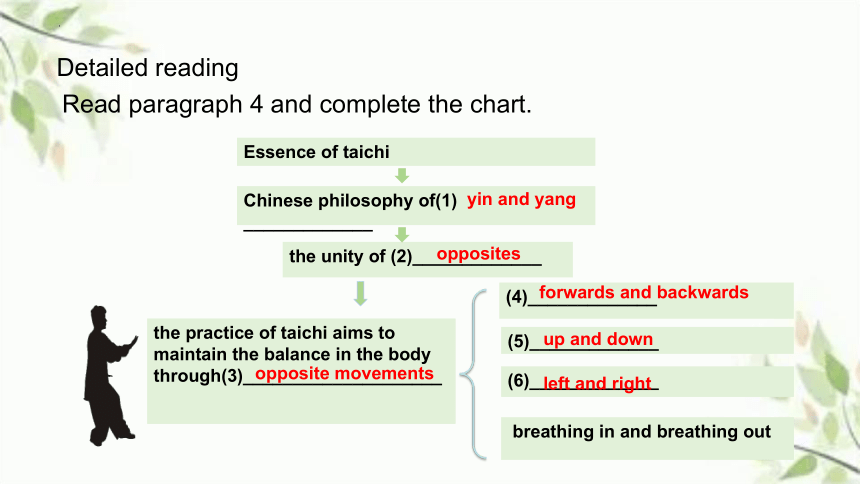

文档简介
(共22张PPT)
Finding a balance:
my tai chi experience
Extended reading, Unit 2, Book 2
Lead-in
If our school set up a tai chi club, would you like to join it
Appreciation
Which shows the right structure of the article
Fast reading
Part1(para.1) A general ____________ to the author’s experience of learning tai chi
Part2(paras2-4)_________about the taichi experience
Part3(para5) Tai chi’s positive __________ on my everyday life
Para. 2 ______________of tai chi
Para.3 His own ________________________
Para.4___________ behind tai chi
introduction
Details
effects
History/Origin
Culture
learning experience and feelings
Fast reading
Scan the article and choose the one which best describes the change in the author’s attitudes.
Time
Interest
Time
Time
Time
Interest
Interest
Interest
A
B
C
D
Fast reading
Detailed reading
Read paragraph 2 and answer:
What are the two different explanations for the origin of tai chi
Essence of taichi
Chinese philosophy of(1) _____________
the unity of (2)_____________
the practice of taichi aims to maintain the balance in the body through(3)____________________
(4)_____________
(5)_____________
(6)_____________
breathing in and breathing out
yin and yang
opposites
opposite movements
forwards and backwards
up and down
left and right
Detailed reading
Read paragraph 4 and complete the chart.
Thinking
How do you understand “ there is no shadow without light” Why is it used here
Where there is light, there is a shadow. The author uses this example to explain the unity of opposites, which cannot exist without each other.
We should achieve a balance between study and fun .
We should achieve a balance between __________ and__________ .
We should achieve a balance between __________ and __________ .
We should achieve a balance between ___________ and__________ .
ugliness
beauty
good
evil
success
failure
Thinking
Make up more sentences to explain the unity of opposites.
When my friend first suggested that we join the new Tai Chi Club at school, I hesitated. I always believed tai chi was for old people. After the first class, however, I had to admit that I had been wrong about tai chi. It was amazing! One year later, I can honestly say it has had a huge effect on me physically and mentally. Just as importantly, practising tai chi has inspired me to explore the Chinese culture behind it.
1. when my friend first suggested that we join the new Tai Chi Club at school
when引导的时间状语从句
2. that we join the new Tai Chi Club at school
that引导的宾语从句
3. tai chi was for old people 省略引导词that的宾语从句
I believed that=I held the belief that(此时that引导同位语从句)
4. that I had been wrong about tai chi
that引导的宾语从句
5. it has had a huge effect on me physically and mentally
省略引导词that的宾语从句
6. behind it后置定语
When my friend first suggested② that we join the new Tai Chi Club at school, I hesitated②. I always believed tai chi was for old people. After the first class, however, I had to admit③ that I had been wrong about④ tai chi. It was amazing! One year later, I can honestly say it has had a huge effect on me physically and mentally⑤. Just as importantly, practising tai chi has inspired me to explore⑥ the Chinese culture behind it.
1. suggest that sb (should) do 表示“建议”“命令”“要求”等意思+句子should do
一坚持 insist 两命令 order, command
三建议advise, suggest, propose 四要求 demand, require, request, ask
2. hesitate v. hesitation n. hesitant adj.
3. admit (admitted) v. admission n. admit (to) doing
4. be wrong about...误解,在...方面是错误的
5. have a huge effect on me physically and mentally 对我的身心有巨大的影响
6. inspire sb to do sth inspiration n. explore v. exploration n.
draw inspiration from...
be inspired by...
The first few tai chi classes were fun and easy, and the moves really caught my imagination, with descriptive names like "white crane spreading its wings" and “golden rooster standing on one leg”. When I asked my coach where these interesting names came from, he told me about the history of tai chi. Zhang Sanfeng,a 13th-century Taoist, was said to have invented tai chi after drawing inspiration from a fight between a snake and a bird.
1. When I asked my coach where these interesting names came from
when引导的时间状语从句
where引导的宾语从句
2. a 13th-century Taoist
为Zhang Sanfeng同位语
The first few tai chi classes were fun and easy, and the moves① really caught my imagination②, with descriptive③ names like "white crane spreading④ its wings" and “golden rooster standing on one leg”. When I asked my coach where these interesting names came from⑤, he told me about the history of tai chi. Zhang Sanfeng,a 13th-century Taoist, was said to⑥ have invented⑦ tai chi after drawing inspiration from a fight between a snake and a bird.
1. move v. 移动,使感动 n. 移动,搬家,招式
2.catch one’s imagination 激发某人的想象力
3. descriptive adj. 描写的,说明的,描述性的 describe v. description n.
4. spread v.n. 展开,伸开,扩散,蔓延
5. come from...
when it comes to.... 当谈到/提到/涉及到....的时候
6. be said to...据说,传说......
7. invent v.发明,创造 invention n. inventor n.
However, nowadays people tend to believe that Chen Wangting, a 17th-century master of Chinese martial arts, developed tai chi based on martial arts skills. No wonder some tai chi moves are named after animals-Chinese martial arts have a long-standing practice of imitating animals. Chen Wangting's original set of moves is called Chen-style tai chi,but other styles of tai chi have since been developed, including Yang-style, Wu-style and Sun-style.
1. that Chen Wangting, a 17th-century master of Chinese martial arts, developed tai chi based on martial arts skills
that引导的宾语从句,其中,a 17th-century master of Chinese martial arts是Chen Wangting的同位语,based on martial arts skills是tai chi的后置定语,可以改写为 which is based on martial arts skills
However, nowadays people tend to believe that Chen Wangting, a 17th-century master of Chinese martial arts, developed tai chi based on martial arts skills. No wonder some tai chi moves are named after① animals-Chinese martial arts have a long-standing practice of② imitating animals. Chen Wangting's original set of moves is called Chen-style tai chi, but other styles of tai chi have since been developed, including Yang-style, Wu-style and Sun-style.
1. be named after...以...命名
2. have a long-standing practice of... ...的做法由来已久
After learning the basics of tai chi in those first few classes, I found myself bored and aching from doing the same moves over and over again. Luckily, my coach taught me how to relax my muscles and focus on peace of mind while performing the routine. With these requirements of tai chi in mind, I found to my satisfaction that my balance and flexibility slowly improved, that I was able to do more difficult moves, and that my love for tai chi returned stronger than ever.
1. After learning the basics of tai chi in those first few classes作时间状语
2. find muself bored and aching
find后接复合宾语,find+宾语+宾补 类似用法的词有make, keep, leave, have
find+n./pron.+adj./adv./介词短语/doing/done
3. taught me how to relax my muscles and focus on peace of mind
me间宾; 疑问词+不定式直宾
4. With these requirements of tai chi in mind with复合结构, 此处表状态
可以换成bearing/keeping these requirements of tai chi in mind
5. that my balance and flexibility slowly improved, that I was able to do more difficult moves, and that my love for tai chi returned stronger than ever.
that引导的宾语从句,作动词found的宾语,第一个that可省略
After learning the basics of① tai chi in those first few classes, I found myself bored and aching from doing the same moves over and over again②. Luckily, my coach taught me how to relax my muscles and focus on peace of mind while performing the routine. With these requirements of tai chi in mind, I found to my satisfaction③ that my balance and flexibility slowly improved, that I was able to do more difficult moves, and that my love for tai chi returned stronger than ever.
1. the basics of... ...的基本知识
2. over and over again 一再地;反复不断地
3. to my satisfaction令我满意的是 with satisfaction 满意地 satisfy v. satisfied adj.=content satisfying adj.
In time, I began to look into the ancient Chinese culture behind tai chi. I discovered that tai chi is deeply rooted in the Chinese philosophy of yin and yang, which are believed to form the unity of opposites. Neither can exist independent of the other; for example, there is no shadow without light. The practice of taichi aims to maintain the balance of yin and yang in the body through opposite movements: forwards and backwards, up and down, left and right, breathing in and breathing out. Eventually, tai chi brings about a state of physical balance and mental peace.
1. that tai chi is deeply rooted in the Chinese philosophy of yin and yang, which are believed to form the unity of opposites
that引导的宾语从句, 其中包含which引导的非限制性定语从句
In time①, I began to look into② the ancient Chinese culture behind tai chi. I discovered that tai chi is deeply rooted in③ the Chinese philosophy of yin and yang④, which are believed to form the unity of opposites⑤. Neither can exist independent of⑥ the other; for example, there is no shadow without light. The practice of taichi aims to maintain the balance of yin and yang⑦ in the body through opposite movements: forwards and backwards, up and down, left and right, breathing in and breathing out⑧. Eventually, tai chi brings about⑨ a state of physical balance and mental peace⑩.
1. in time 及时;最终
2. look into...调查...
3. be deeply rooted in...深深植根于...
4. the Chinese philosophy of yin and yang中国的阴阳哲学 philosopher n.
5. form the unity of opposites形成对立统一 opposite adj.对面的;相反的,迥然不同的(通常n.前)
6. exist/be independent of...独立于...
7. maintain the balance of yin and yang维持阴阳的平衡
8. breathe in and breathe out吸进和呼出
9. bring about导致,引起
10. a state of physical balance and mental peace一种身体平衡和心态平和的状态
state n.状态,状况,国家,州,邦 v. 陈述;说明;声明
statement n.陈述,声明,说明
A year of practising tai chi has had a positive effect on my everyday life. I sleep better at night, and I am more energetic during the day. I feel happier and more confident. Tai chi has taught me to relax my mind, enabling me to stay cool in stressful situations. I am sure I will continue to practise tai chi and enjoy the benefits it has brought me.
1. enabling me to stay cool in stressful situations现在分词短语作状语,可以改为which enables me to stay cool in stressful situations
2. I will continue to practise tai chi and enjoy the benefits it has brought me 作形容词sure的宾语,省略that的宾语从句,
其中,it has brought me为修饰先行词benefits 的定语从句,省略了关系词that/which
Thanks
Finding a balance:
my tai chi experience
Extended reading, Unit 2, Book 2
Lead-in
If our school set up a tai chi club, would you like to join it
Appreciation
Which shows the right structure of the article
Fast reading
Part1(para.1) A general ____________ to the author’s experience of learning tai chi
Part2(paras2-4)_________about the taichi experience
Part3(para5) Tai chi’s positive __________ on my everyday life
Para. 2 ______________of tai chi
Para.3 His own ________________________
Para.4___________ behind tai chi
introduction
Details
effects
History/Origin
Culture
learning experience and feelings
Fast reading
Scan the article and choose the one which best describes the change in the author’s attitudes.
Time
Interest
Time
Time
Time
Interest
Interest
Interest
A
B
C
D
Fast reading
Detailed reading
Read paragraph 2 and answer:
What are the two different explanations for the origin of tai chi
Essence of taichi
Chinese philosophy of(1) _____________
the unity of (2)_____________
the practice of taichi aims to maintain the balance in the body through(3)____________________
(4)_____________
(5)_____________
(6)_____________
breathing in and breathing out
yin and yang
opposites
opposite movements
forwards and backwards
up and down
left and right
Detailed reading
Read paragraph 4 and complete the chart.
Thinking
How do you understand “ there is no shadow without light” Why is it used here
Where there is light, there is a shadow. The author uses this example to explain the unity of opposites, which cannot exist without each other.
We should achieve a balance between study and fun .
We should achieve a balance between __________ and__________ .
We should achieve a balance between __________ and __________ .
We should achieve a balance between ___________ and__________ .
ugliness
beauty
good
evil
success
failure
Thinking
Make up more sentences to explain the unity of opposites.
When my friend first suggested that we join the new Tai Chi Club at school, I hesitated. I always believed tai chi was for old people. After the first class, however, I had to admit that I had been wrong about tai chi. It was amazing! One year later, I can honestly say it has had a huge effect on me physically and mentally. Just as importantly, practising tai chi has inspired me to explore the Chinese culture behind it.
1. when my friend first suggested that we join the new Tai Chi Club at school
when引导的时间状语从句
2. that we join the new Tai Chi Club at school
that引导的宾语从句
3. tai chi was for old people 省略引导词that的宾语从句
I believed that=I held the belief that(此时that引导同位语从句)
4. that I had been wrong about tai chi
that引导的宾语从句
5. it has had a huge effect on me physically and mentally
省略引导词that的宾语从句
6. behind it后置定语
When my friend first suggested② that we join the new Tai Chi Club at school, I hesitated②. I always believed tai chi was for old people. After the first class, however, I had to admit③ that I had been wrong about④ tai chi. It was amazing! One year later, I can honestly say it has had a huge effect on me physically and mentally⑤. Just as importantly, practising tai chi has inspired me to explore⑥ the Chinese culture behind it.
1. suggest that sb (should) do 表示“建议”“命令”“要求”等意思+句子should do
一坚持 insist 两命令 order, command
三建议advise, suggest, propose 四要求 demand, require, request, ask
2. hesitate v. hesitation n. hesitant adj.
3. admit (admitted) v. admission n. admit (to) doing
4. be wrong about...误解,在...方面是错误的
5. have a huge effect on me physically and mentally 对我的身心有巨大的影响
6. inspire sb to do sth inspiration n. explore v. exploration n.
draw inspiration from...
be inspired by...
The first few tai chi classes were fun and easy, and the moves really caught my imagination, with descriptive names like "white crane spreading its wings" and “golden rooster standing on one leg”. When I asked my coach where these interesting names came from, he told me about the history of tai chi. Zhang Sanfeng,a 13th-century Taoist, was said to have invented tai chi after drawing inspiration from a fight between a snake and a bird.
1. When I asked my coach where these interesting names came from
when引导的时间状语从句
where引导的宾语从句
2. a 13th-century Taoist
为Zhang Sanfeng同位语
The first few tai chi classes were fun and easy, and the moves① really caught my imagination②, with descriptive③ names like "white crane spreading④ its wings" and “golden rooster standing on one leg”. When I asked my coach where these interesting names came from⑤, he told me about the history of tai chi. Zhang Sanfeng,a 13th-century Taoist, was said to⑥ have invented⑦ tai chi after drawing inspiration from a fight between a snake and a bird.
1. move v. 移动,使感动 n. 移动,搬家,招式
2.catch one’s imagination 激发某人的想象力
3. descriptive adj. 描写的,说明的,描述性的 describe v. description n.
4. spread v.n. 展开,伸开,扩散,蔓延
5. come from...
when it comes to.... 当谈到/提到/涉及到....的时候
6. be said to...据说,传说......
7. invent v.发明,创造 invention n. inventor n.
However, nowadays people tend to believe that Chen Wangting, a 17th-century master of Chinese martial arts, developed tai chi based on martial arts skills. No wonder some tai chi moves are named after animals-Chinese martial arts have a long-standing practice of imitating animals. Chen Wangting's original set of moves is called Chen-style tai chi,but other styles of tai chi have since been developed, including Yang-style, Wu-style and Sun-style.
1. that Chen Wangting, a 17th-century master of Chinese martial arts, developed tai chi based on martial arts skills
that引导的宾语从句,其中,a 17th-century master of Chinese martial arts是Chen Wangting的同位语,based on martial arts skills是tai chi的后置定语,可以改写为 which is based on martial arts skills
However, nowadays people tend to believe that Chen Wangting, a 17th-century master of Chinese martial arts, developed tai chi based on martial arts skills. No wonder some tai chi moves are named after① animals-Chinese martial arts have a long-standing practice of② imitating animals. Chen Wangting's original set of moves is called Chen-style tai chi, but other styles of tai chi have since been developed, including Yang-style, Wu-style and Sun-style.
1. be named after...以...命名
2. have a long-standing practice of... ...的做法由来已久
After learning the basics of tai chi in those first few classes, I found myself bored and aching from doing the same moves over and over again. Luckily, my coach taught me how to relax my muscles and focus on peace of mind while performing the routine. With these requirements of tai chi in mind, I found to my satisfaction that my balance and flexibility slowly improved, that I was able to do more difficult moves, and that my love for tai chi returned stronger than ever.
1. After learning the basics of tai chi in those first few classes作时间状语
2. find muself bored and aching
find后接复合宾语,find+宾语+宾补 类似用法的词有make, keep, leave, have
find+n./pron.+adj./adv./介词短语/doing/done
3. taught me how to relax my muscles and focus on peace of mind
me间宾; 疑问词+不定式直宾
4. With these requirements of tai chi in mind with复合结构, 此处表状态
可以换成bearing/keeping these requirements of tai chi in mind
5. that my balance and flexibility slowly improved, that I was able to do more difficult moves, and that my love for tai chi returned stronger than ever.
that引导的宾语从句,作动词found的宾语,第一个that可省略
After learning the basics of① tai chi in those first few classes, I found myself bored and aching from doing the same moves over and over again②. Luckily, my coach taught me how to relax my muscles and focus on peace of mind while performing the routine. With these requirements of tai chi in mind, I found to my satisfaction③ that my balance and flexibility slowly improved, that I was able to do more difficult moves, and that my love for tai chi returned stronger than ever.
1. the basics of... ...的基本知识
2. over and over again 一再地;反复不断地
3. to my satisfaction令我满意的是 with satisfaction 满意地 satisfy v. satisfied adj.=content satisfying adj.
In time, I began to look into the ancient Chinese culture behind tai chi. I discovered that tai chi is deeply rooted in the Chinese philosophy of yin and yang, which are believed to form the unity of opposites. Neither can exist independent of the other; for example, there is no shadow without light. The practice of taichi aims to maintain the balance of yin and yang in the body through opposite movements: forwards and backwards, up and down, left and right, breathing in and breathing out. Eventually, tai chi brings about a state of physical balance and mental peace.
1. that tai chi is deeply rooted in the Chinese philosophy of yin and yang, which are believed to form the unity of opposites
that引导的宾语从句, 其中包含which引导的非限制性定语从句
In time①, I began to look into② the ancient Chinese culture behind tai chi. I discovered that tai chi is deeply rooted in③ the Chinese philosophy of yin and yang④, which are believed to form the unity of opposites⑤. Neither can exist independent of⑥ the other; for example, there is no shadow without light. The practice of taichi aims to maintain the balance of yin and yang⑦ in the body through opposite movements: forwards and backwards, up and down, left and right, breathing in and breathing out⑧. Eventually, tai chi brings about⑨ a state of physical balance and mental peace⑩.
1. in time 及时;最终
2. look into...调查...
3. be deeply rooted in...深深植根于...
4. the Chinese philosophy of yin and yang中国的阴阳哲学 philosopher n.
5. form the unity of opposites形成对立统一 opposite adj.对面的;相反的,迥然不同的(通常n.前)
6. exist/be independent of...独立于...
7. maintain the balance of yin and yang维持阴阳的平衡
8. breathe in and breathe out吸进和呼出
9. bring about导致,引起
10. a state of physical balance and mental peace一种身体平衡和心态平和的状态
state n.状态,状况,国家,州,邦 v. 陈述;说明;声明
statement n.陈述,声明,说明
A year of practising tai chi has had a positive effect on my everyday life. I sleep better at night, and I am more energetic during the day. I feel happier and more confident. Tai chi has taught me to relax my mind, enabling me to stay cool in stressful situations. I am sure I will continue to practise tai chi and enjoy the benefits it has brought me.
1. enabling me to stay cool in stressful situations现在分词短语作状语,可以改为which enables me to stay cool in stressful situations
2. I will continue to practise tai chi and enjoy the benefits it has brought me 作形容词sure的宾语,省略that的宾语从句,
其中,it has brought me为修饰先行词benefits 的定语从句,省略了关系词that/which
Thanks
